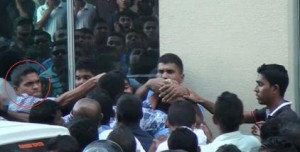Islamic radicalism, which played a key role in the ouster of the government of Mohammed Nasheed, continues to grow in the Maldives several months after his ‘resignation’, writes Yameen Rasheed for Himal Southasian magazine.
“While Nasheed has repeatedly warned of the danger of growing religious intolerance, political polarisation around the issue has also meant that for the first time space has opened up that allows protests and criticism of religious extremists.
Religion has historically been extensively used for political control in the Maldives. While the active targeting of political opponents as apostates might be relatively modern, the Maldives has had a xenophobic view of ‘foreign religions’ for much longer. This state of fear has been carefully preserved and cultivated instead of being eradicated by modern dictators like former President Maumoon Abdul Gayoom, who found it a useful political tool.
As anti-Gayoom sentiments spread, religious radicalism gained acceptance as a legitimate avenue of dissent. Towards the end of the democratic uprising in the late 2000’s, as the restrictions on media and freedom of speech were gradually lifted, Salafi radio stations mushroomed and bookstores began to sell fiery, jihadi titles publicly. A casual stroll down the capital today reveals an overwhelming majority of women wearing burqas – a dramatic transformation that took less than a decade.
Unlike in the Gayoom era when Islamic fundamentalism was harshly suppressed to project an air of stability and peace, perhaps with the tourism industry in mind, Nasheed’s administration publicly acknowledged the problem of widespread religious fundamentalism. Consequently, his government made the calculated move to align itself closely with India and the West, while controversially renewing ties with Israel – a move that sparked an outcry from the religious right.
Nasheed often defended the traditionally liberal, moderate and Sufism-influenced Maldivian belief system, and appealed to the public to reject imported practices such as female genital mutilation and keeping concubines. He also publicly threw his weight behind cultural activities such as music and dance which had long been under attack from the ultra-conservative religious right.
Perhaps as a result, the events leading up to the dramatic toppling of the first democratically elected government in February 2012 had a distinctly religious nature. The first major protests against the MDP government launched in early 2010 were against the government’s alleged plans to permit the sale of alcohol to foreigners in an upmarket hotel in the capital. Following the success of that protest, all the subsequent protests against the MDP government took on a religious tone, labelling the MDP as a promoter of ‘irreligiousness’.
In October 2011, during the 18th SAARC summit in Addu city, opposition parties organised strong protests with radical religious overtones. When monuments such as the statue of a lion gifted by Sri Lanka were declared ‘idols of worship’ and vandalised, the vandals were hailed as ‘national heroes’ by the parties which are now represented in Waheed’s cabinet. These parties also condemned Navanetham Pillay, the UN High Commissioner for Human Rights, when she spoke against medieval practices such as public flogging, which are still prevalent in the Maldives. Protesters on the street raised placards demanding that Pillay be flogged.
The series of religious protests culminated in a massive rally on 23 December 2011, when a coalition of opposition parties came under one umbrella to label the government ‘un-Islamic’.
The December rally exposed a dangerous strategy employed by the then-opposition coalition – a disturbing willingness to steer the rhetoric to the far, militant right. The official website for the protest even put up a demand for people who ‘went against Islam’ to be killed. The article was soon taken down, citing ‘technical errors’, but not before it was reported in the local media.
Although the 7 February police and military mutiny that eventually led to the fall of the Nasheed-led government was sparked off by clashes between pro- and anti-government groups, it ended up emitting strong religious tones by the next day. Videos from that fateful day show uniformed military and police personnel marching down the streets to loud chants of ‘Allahu Akbar!’, as they proceeded to attack the MDP party campus.
Ironically, by giving voice to an Islamic party, Nasheed allowed the Adhaalath Party to run programs preaching the conservative form of Islam to targeted sections of the society, including prison inmates, police and military personnel. When Nasheed announced his ‘resignation’, top police officials, along with the alleged coup leaders, chanted religious slogans loudly in celebration.
Meanwhile, vandals had broken into the national museum and smashed ancient coral statues of the Buddha and other priceless artefacts from the Buddhist period of Maldivian history.
Stanford-educated President Waheed personally holds modern, secular, liberal views much like Nasheed. However, unlike Nasheed, he simply does not have enough political clout to stand up to the religious right. Indeed, in late-February in an effort to cement his support base among the Islamists, Waheed gave a fiery speech, invoking jihadi phrases and calling upon the ‘mujahideen’ to protect the national identity. Recently the Ministry of Islamic Affairs requested Waheed to allow the military and police to grow beards. Given that his fledgling National Unity Party has no elected members in either the Parliament or the local council, it remains to be seen how Waheed will respond to pressure from ultra-orthodox sections in his government.”

